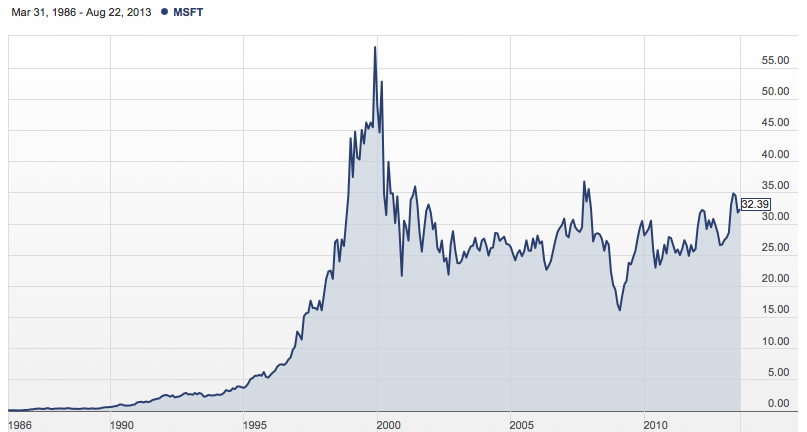8/24/13 22:11
Managers vs. Leaders
Steve Ballmer announced his retirement today, and the pundits are finally getting their chance to publish their assessments. I’m sure many have been sitting on them for years. It can all be summed up by one chart:

Microsoft stock performance over its lifetime is neatly divided into two regimes under two CEOs. It’s not too hard to see where one ends and the other begins.
It got me thinking about the difference between a good manager and a good leader.
Managers keep things going.
By all accounts, Steve Ballmer is the epitome, if not caricature, of the modern corporate manager. He is organized, creates disciplined plans, delegates, and holds people accountable. If performance doesn’t meet expectations, he is not shy about firing even long tenured and strong executives. Ballmer is all about discipline, and getting the trains to run on time, which they generally have under his watch.Ballmer has done a remarkable job holding on to the status quo and preserving Microsoft’s structure from 2000 through 2013. Through the DOJ trial, the numerous recessions, and titanic industry shifts. If you ask people what Microsoft is about today, they’d probably tell you “Windows and Office, plus some other stuff that loses money”, they they wouldn’t be far off.
This is the hallmark of a good manager: Someone who keeps things running, tuning it up here and there, but defending and preserving it through hell and high water.
Look at the stock chart: That period from 2000-2013 looks just like a thermostat. Despite huge external forces, Microsoft has somehow managed to stay about the same through it all.
The one thing Steve Ballmer never did as CEO of Microsoft is to change the company. Sure, his very last act as CEO was to announce the need for change, very vaguely to a “Devices and Services company”, and commit the company to changing. However, in his announcement today, he himself has decreed that he is not the one to lead that change.
Leaders change things.
When we think of someone who is “a leader”, we think of someone who creates change. They wake up one day and either realize that change is needed, or change is what they want, then go about making it happen. They are leaders, by definition because they are the first to recognize and move towards a new reality, before that reality is forced upon them.This quality of recognizing the need for change in advance, then acting upon it is what sets great leaders apart from everyone else. It’s a tricky business. Changing too soon is as dangerous as changing too late.
This implies that a good leader has a a good grasp of reality and where things are heading. That “vision” thing. It’s essential, but I don’t think this is the key ingredient. If you ask just about anyone where the computing industry is heading in 5 years, they will have a fairly good idea. Something around cloud services, mobile devices, better entertainment at home, and better productivity tools at work.
A more valuable skill is the ability to plan a strategy that acts on that vision, taking into account the business, organizational, and social realities. This is no mean feat, but this is still not the key thing. Any multi-billion dollar corporation is full of people who can churn out strategies and models by the dozen each week.
I think the key quality is the ability to bet heavily on the version of that vision they know is right, before everyone else. Before all the data is in, and before common-sense says it’s an obvious thing to do. This is very, very hard to do, and it’s very, very hard to find someone who can do this well.
Microsoft isn’t the only one.
Industries tend to happen in waves. Microsoft is a product of the great computing wave that started in the 80s. Virtually all of the companies in that wave are in a similar situation. Their founders have long since retired, and they are being run by strong managers who keep the lights on.The great comeback story of Apple isn’t likely to happen here. If Bill Gates really wanted to come back, he would have years ago.
Apple itself is not in a dissimilar situation. By all accounts Tim Cook is a disciplined and effective manager. He is organized, creates disciplined plans, delegates, and holds people accountable. If performance doesn’t meet expectations, he is not shy about firing even long tenured and strong executives. Tim s all about discipline, and getting the trains to run on time, which they generally have under his watch.
Tim Cook is an excellent manager.
So far, Apple has done a great job holding on to the status quo. It’s better than ever at doing the things it excels at. Best in class hardware and design, but now with even more discipline and cohesion.The one thing Tim Cook has not yet done as CEO is change the company. Sure, there were significant re-orgs, but these were to consolidate the existing structure, not change it.
It very well might be that Apple still has many more years of runway left on its current trajectory, and just doing what it does best will pull in record profits year after year. That’s what Microsoft just went through.
However, what’s happening at Microsoft today serves as a foreshadowing.
The day will undoubtedly come when the world changes again, and a new reality is needed. The question is: Will they be ones to change, or will change be forced upon them?
Related: Business.
comments powered by Disqus